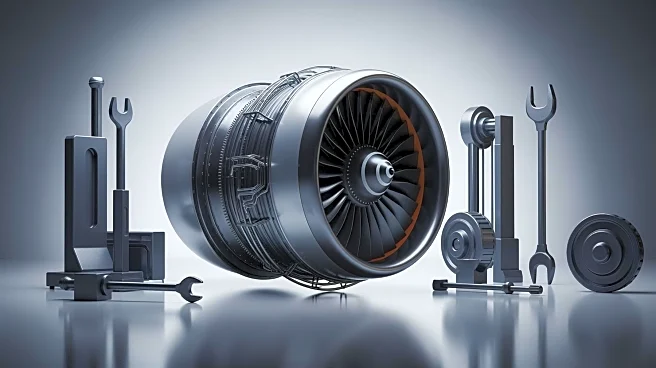What's Happening?
Airbus and Boeing executives have highlighted the need for additional suppliers to alleviate constraints affecting both new aircraft manufacturers and aftermarket providers. William Ampofo, SVP of parts and distribution and supply chain, emphasized the necessity
of increasing capacity and introducing new entrants to the supplier base. This call comes as both companies ramp up production rates to meet growing demand and address recent shortfalls. The industry faces material shortages, including flight deck windows and various structural components, which are exacerbated by the exit of key suppliers. Efforts to expand used serviceable materials (USM) activities are underway, but these alone are insufficient to close the capacity gap. Richard Stoddart, CEO of Satair and Airbus head of material services, noted the challenges in certifying new suppliers and the significant investments required to develop complex systems.
Why It's Important?
The call for more suppliers is crucial for the aviation industry, which is experiencing increased demand for new aircraft and maintenance of older models. The shortage of materials and components can lead to production delays and increased costs, affecting airlines and passengers. By expanding the supplier base, Airbus and Boeing aim to enhance efficiency and reliability in the supply chain, potentially reducing costs and improving service delivery. This move could also stimulate investment in the sector, encouraging innovation and the development of new technologies. The broader impact includes potential job creation and economic growth, as new suppliers enter the market and existing ones expand their operations.
What's Next?
Airbus and Boeing are likely to continue working closely with existing suppliers to improve efficiency and explore alternative sources. The industry may see new entrants as companies seek to capitalize on the demand for aviation components. This could lead to increased competition and innovation, driving improvements in quality and cost-effectiveness. Stakeholders, including investors and regulatory bodies, will play a critical role in facilitating the growth of the supplier base, ensuring compliance with industry standards and supporting the necessary investments.
Beyond the Headlines
The expansion of the supplier base could have long-term implications for the aviation industry, including increased resilience against future disruptions. It may also lead to a shift in the industry's approach to forecasting and demand planning, as manufacturers seek to provide greater visibility to suppliers. This could foster a more collaborative environment, where information sharing and strategic partnerships become the norm, ultimately benefiting the entire supply chain.















